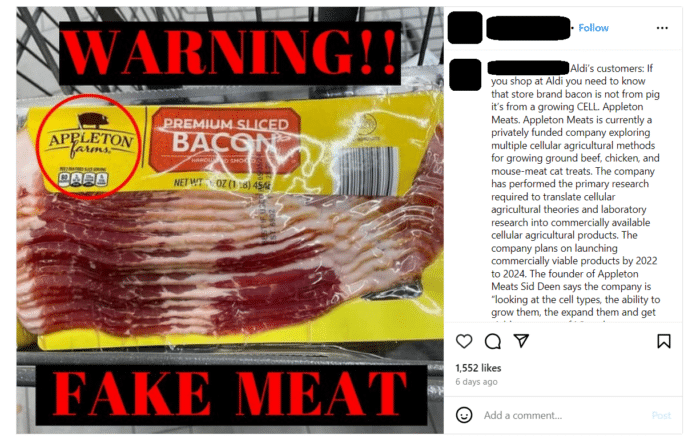
A famous quote from the movie Elf (2003)
When we first started writing about Aldi in 2016, our primary goal was to review Aldi products. We would see items throughout the store, including limited buys, that we couldn’t find any information online about. We hoped that we’d be able to fill that gap by creating a place to talk about those things.
While most of our writing is about just that — trying to plug the information hole in the Aldi universe — we’ve also found ourselves addressing claims that get put out about Aldi, either on other blogs or on social media. On several occasions, we’ve seen individuals or outlets put out information regarding Aldi that isn’t true. Sometimes it’s a mistake, such as one caused by a shopper not reading a story carefully; other times it’s intentional, either as a hoax or even a scam. We try to write about those untruths when we spot them.
What follows are five of the worst fake Aldi stories we’ve seen.
5. The “Aldi sells horse meat” rumor
This rumor is a good example of how an old story that was true in one part of the world can evolve into something that’s not true. Back in 2013, a massive horse meat scandal rocked European markets, impacting grocers, restaurants, and caterers. Investigators at the time found varying amounts of horse meat in much of the European beef supply. The United States was not affected, and European officials quickly moved to remove the horse meat from the different markets.
Years later — like a twisted game of telephone — that old story morphed into a claim that Aldi US was selling horse meat. That’s not true: Aldi US has never sold horse meat. This fake story seems to have a habit of coming back every couple of years, no doubt to the irritation of Aldi customer service reps.
4. The “Aldi is growing its pork in a lab” rumor
This doozy of a yarn first showed up in March 2024 after a few people on Facebook and Instagram came to the mistaken conclusion that Appleton Farms — an Aldi private label — was the same as Appleton Meats — a Canadian startup that may or may not still exist. While others jumped into the comments to get the facts straight, these stories were shared thousands of times by other users. Clearly it was on the minds of many shoppers, as our own piece debunking the rumor was our top post for several days.
3. The “Aldi to go full organic” hoax
One of the real challenges of the current internet is the growth of “content mills,” websites that churn out stories that 1) may or may not be true and 2) feature writers who may or may not have any idea what they’re writing about. Google has done more to crack down on these kinds of mills in recent years, but they’re still out there, aided (unfortunately) but the likes of AI and other tools.
A few years ago, a number of these sketchy sites pushed identical stories with the identical headline: “Aldi to Go Full Organic, Bans Pesticides and Rivals Whole Foods as Healthiest Grocery Store.” We rate this as a legitimate hoax because it seems clear to us the article was intended to deceive for clicks. We wrote about this story a while back and concluded that the headline was false.
2. The “Aldi online coupon” scam
Shoppers always have to be on guard for scams that play at their emotions, including fear and anger. This particular scam tries to exploit the desire to get a deal. To be fair, Aldi has been known to sometimes give out physical discounts and coupons ahead of a store’s grand opening, but never any kind of digital coupon. Simply put: any Aldi coupon you see online is a fake coupon.
While social media sites like Facebook have done better in recent years to stop these kinds of scams, they’re still out there. You have to be especially careful because the fake pages used to push these coupons may try to con users into giving up personal information.
1. The “Aldi giving out free groceries on Facebook” scam
A cousin of the coupon scam, this scam is arguably more nefarious. Every once in a while, some fake social media page claims that users can get a free grocery box or some other goodies by doing a series of tasks. Often those tasks can include clicking on dangerous links. Other times the fake page will wait until the post is widespread, then edit the post to add such a dangerous link.
While we’ve written our own piece warning about this scam, it still pops up from time to time. Just know that if you see a post claiming an Aldi giveaway … stay away. It’s not real.
Closing Thoughts:
Like everything on the internet, we encourage shoppers to be careful and critical when taking in Aldi-related news and Aldi-related claims. If it seems too crazy to be true, it’s likely fake, and if it seems too good to be true, it probably is.
We’ll continue to do our part by covering these claims when we catch them.









